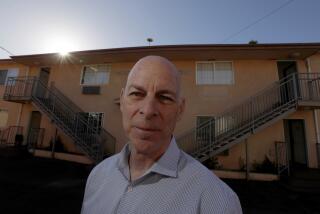Panel Says Pierce OKd $27-Million Award for Builder After Short Talk
WASHINGTON —
Former Housing Secretary Samuel R. Pierce Jr. ordered a $27-million rent-subsidy award after a 20-minute meeting with a prominent Republican developer who stands to make at least $1.2 million in profit on the deal, congressional investigators said Friday.
Gerald R. Carmen, head of the General Services Administration in the early years of the Ronald Reagan Administration, defended his personal appeal to Pierce on behalf of a 316-unit low-income housing project in Texas as every citizen’s right to petition the government.
“I don’t see it as a rip-off. I see it as the economic process at work,” Carmen testified before a House Government Operations subcommittee that is investigating influence-peddling and political favoritism at the Department of Housing and Urban Development during Pierce’s eight-year tenure at the agency’s helm.
“You were milking this program,” countered Rep. Tom Lantos (D-San Mateo), chairman of the panel. “You made a lot of money on it without investing a dime.”
Pierce, who recently invoked the Fifth Amendment privilege against self-incrimination to avoid testimony before the panel, said last May that he was not a “hands-on” manager and let a three-member committee decide how to allocate scarce funds for such projects.
Documents made public by the subcommittee, however, indicated that the funding for rehabilitation of apartments in Arlington, Tex., acquired by Carmen and his partner was approved quickly by Pierce after Carmen’s visit with the housing secretary early in 1987.
In fact, according to the memos, the award was made more than a month before the Arlington Housing Authority had even applied for the rent-subsidy allocation. The project was funded under the department’s Section 8 Moderate Rehabilitation Program, which provides subsidies to developers who renovate housing and rent it to low-income tenants.
HUD regulations provide that local housing authorities should initiate requests for such funds. But testimony has shown that developers often started the process, got virtual approval from top HUD officials for specific projects and then got state or city housing authorities to apply for the grants.
In this case, a memo written on March 4, 1987, by Thomas T. Demery, then assistant secretary of housing, to Pierce’s executive assistant, Deborah Gore Dean, listed approval of HUD funds for several projects. A handwritten note added: “plus 316 units for Texas (Arlington TX).”
Carmen said that he did not approach Dean or Demery about the Texas project. A Dean memo to Pierce on April 7, 1987, contained a notation referring to the moderate rehabilitation program that said: “Brooke and Carmen are set.”
Lantos said that the reference involved the Arlington project and an unrelated rent-subsidy project being pushed by former Sen. Edward W. Brooke (R-Mass.), then working as a high-paid consultant on HUD programs.
But Carmen, who was chairman of the Republican Party of New Hampshire and managed Reagan’s successful primary campaign in the state in 1980, said that he only wanted to make sure the project got fair consideration at HUD when he met with Pierce.
In a testy exchange, however, Lantos asserted: “It happened because Pierce made it happen. . . . It’s not illegal, but highly undesirable.”
Lantos said that the paper-work trail left no other logical explanation for the swift approval of the Texas award.
“I was there to push the project,” Carmen acknowledged. “I am a little bit surprised by the way it went. . . . Frankly, it embarrasses me. You showed me something I didn’t want to see.” Under questioning by Rep. Christopher Shays (R-Conn.), Carmen said that the project received federal rent-subsidy allocations of $27 million over 15 years and federal tax credits of $3.2 million.
The tax credits alone, Carmen said, are expected to provide him and his partner with $2.4 million within a few years, although they had to put up less than $75,000 in cash. Carmen put up no money himself.
In addition, the developers set up a general contracting organization on paper--consisting of themselves--and got fees of $100,000 from the rehabilitation work, Carmen testified.
Lantos said HUD’s inspector general has charged that the mortgage appraisal on the project was inflated by $2 million, thus raising the amount of rent subsidies and tax credits for the developers.
More to Read
Get the L.A. Times Politics newsletter
Deeply reported insights into legislation, politics and policy from Sacramento, Washington and beyond. In your inbox three times per week.
You may occasionally receive promotional content from the Los Angeles Times.










